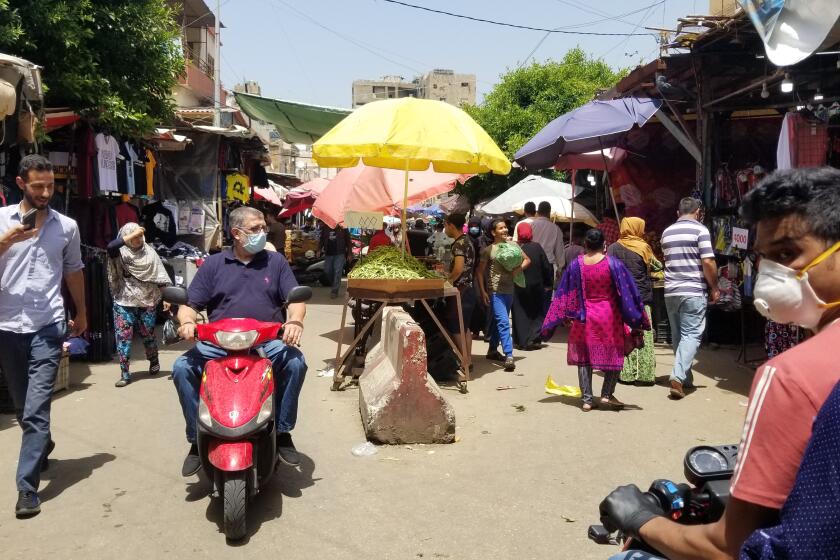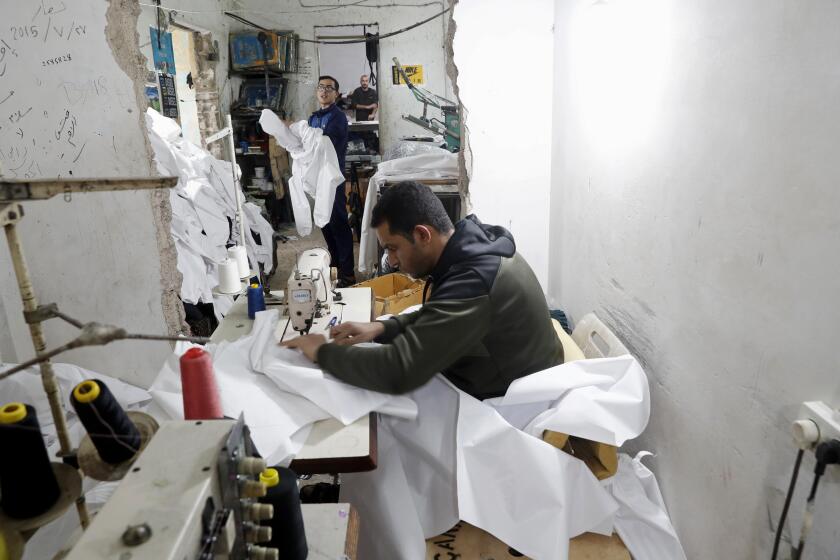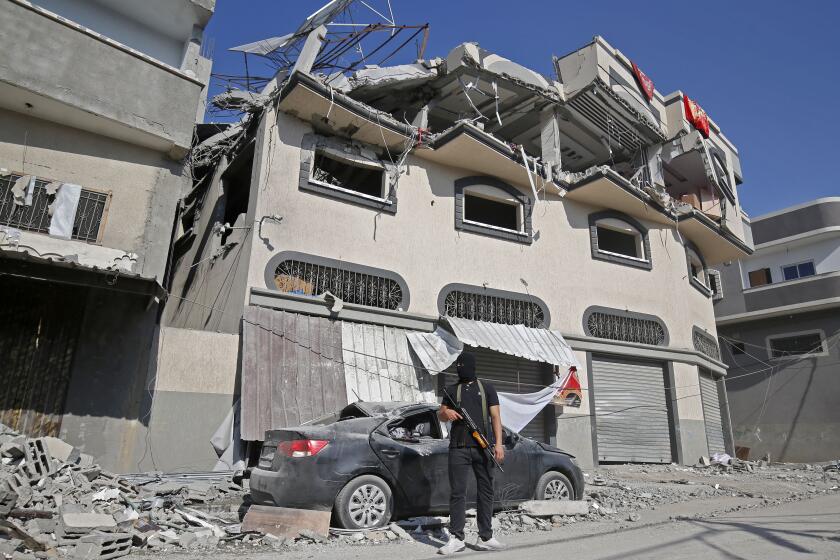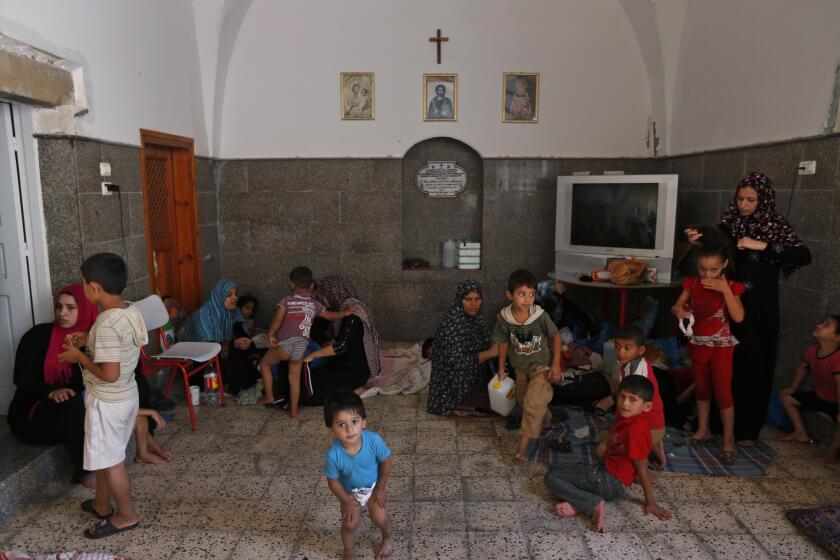Blockade, power outages, now the coronavirus: Lockdown brings new misery to Gaza
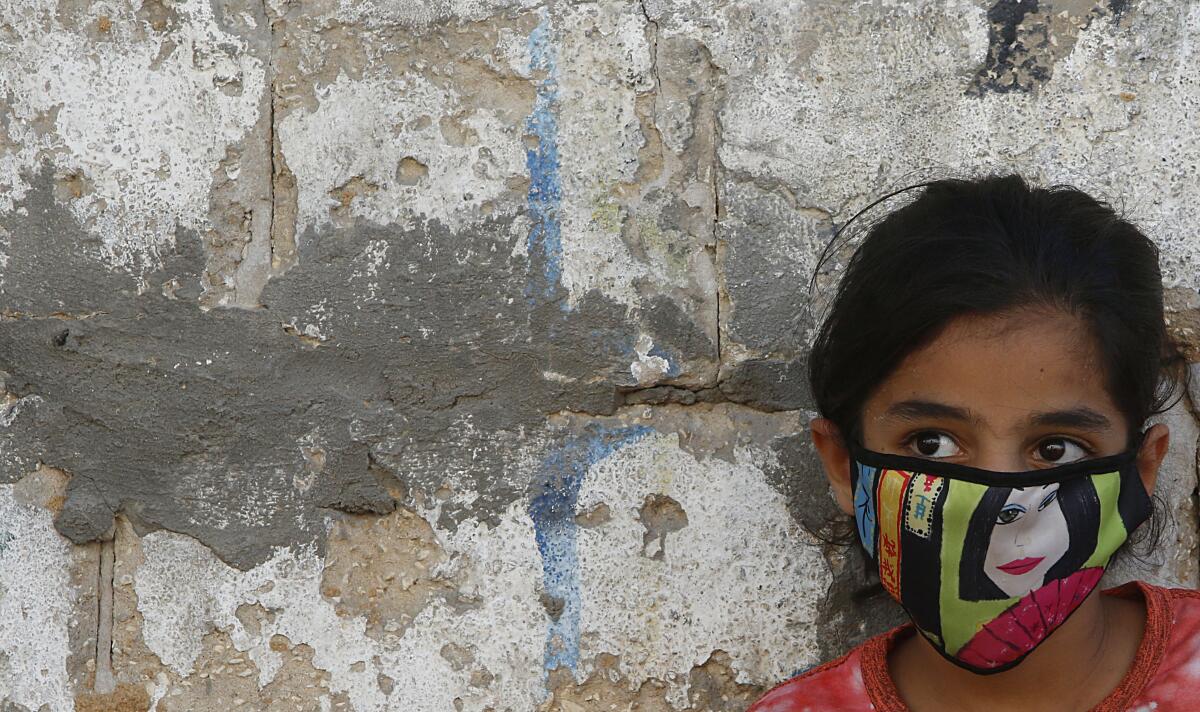
- Share via
GAZA CITY — Ahmed Eissa, a father of two living in the Gaza Strip, was already struggling to make ends meet on $7 a day, dealing with frequent electricity cuts and worried that another war might break out.
Then the coronavirus found its way into the impoverished Palestinian territory, just as Israel was tightening its blockade in a standoff with Gaza’s militant Hamas rulers, and a strict lockdown has confined everyone to their homes.
Now Eissa doesn’t know how he will feed his family.
“I don’t have savings, and I don’t have a job, so no one would lend me money,” he said. “I won’t beg from anyone.”
The restrictions imposed by Hamas are aimed at averting what many fear would be an even bigger catastrophe: a widespread outbreak in a densely populated territory of 2 million where the healthcare system has been devastated by years of war and isolation.
The lockdown was triggered by the discovery earlier this week of the first locally spread cases, after months in which infections were confined to quarantine facilities where all returning travelers were forced to isolate for three weeks. Authorities have not yet determined how the coronavirus made its way into the general population.
With 10 million people around the world packed into refugee camps and settlements, advocates fear the onset of an undetected coronavirus crisis.
Israel and Egypt imposed a crippling blockade on Gaza after Hamas seized power from rival Palestinian forces in 2007. Israel, which has fought three wars and countless smaller battles with Hamas since the takeover, says the closures are needed to prevent the militants from importing and manufacturing arms. Critics view it as a form of collective punishment.
The blockade, the periodic fighting and a longstanding feud between Hamas and the Palestinian Authority in the occupied West Bank have devastated the local economy, which suffers from roughly 50% unemployment.
In recent weeks, Hamas-linked groups have sent incendiary balloons and rockets into Israel in a campaign aimed at pressuring it to ease restrictions and allow large-scale development projects. In response, Israel launched airstrikes on Hamas’ military infrastructure, sealed off Gaza’s fishing zone and closed its sole commercial crossing. That forced Gaza’s only power plant to shut down for lack of fuel.
Most Gazans now get just four hours of electricity a day, leaving them without refrigeration, air conditioning or electric fans for hours on end as temperatures hover around 90 degrees.
Sewing factories in the Gaza Strip are back to working at full capacity, producing masks, gloves and protective gowns, some of which are for Israel.
Eissa’s wife, Majda, describes it as “unbearable.” The family struggles to sleep at night because of the heat and humidity. Her daughters sleep on the tile floor because it’s cooler. They change rooms and open and close windows, trying to catch the occasional breeze.
The water pump in their building runs on electricity, so the taps run dry when the power goes out.
“The dishes and laundry are piling up in the kitchen,” she said. “Everything gets dirty, and I have to keep scrubbing and cleaning using a bottle of water. I can’t bear to stay at home anymore.”
Eissa used to buy from fishermen and then resell the fish in local markets, work that he says brought in around 25 shekels ($7) a day. But the fishermen are marooned by the Israeli closures, and he’s not allowed to leave home because of the lockdown to look for other work.
Israel targeted two senior Islamic Jihad commanders, killing one and sparking the worst bout of fighting with Palestinian militants in recent months.
On Thursday, his parents, who live downstairs, sent him a pot of stew for lunch.
“I don’t know what or how we will eat tomorrow,” he said by phone from his home in the Nusseirat refugee camp in central Gaza. He complained that he had not seen a serious government plan on how to cope with the crisis.
In recent days, authorities have detected 80 cases of local transmission, and two people have died from COVID-19. Hamas has extended the lockdown until Sunday, forcing most businesses to close and setting up checkpoints to limit movement.
“We may have to shut down entire neighborhoods and lock up residents in their houses while providing them with what they need,” Tawfiq Abu Naim, head of Hamas’ security services, told reporters.
Fatima Helles desperately wants Israel’s war with Hamas to end.
Many Gazans live day-to-day on meager wages earned at markets, shops, restaurants and cafes, all of which are shuttered.
About two-thirds of the population are refugees whose families fled or were driven out during the 1948 war surrounding the creation of Israel. More than a million receive food aid from the U.N. agency for Palestinian refugees, but it has been forced to suspend food distribution because of the pandemic and is now providing only healthcare and basic sanitation.
“We are aware that food is even more critical during such a period and are working hard on finding a modality that will allow us to resume this massive food operation in the very near future in a safe way,” said Matthias Schmale, the U.N. agency’s director in Gaza.
The agency launched a program to deliver food to people’s homes in March, at the start of the global pandemic, but ended it when an initial lockdown was lifted.
The electricity crisis also poses challenges, Schmale said.
“If we’re not able to run our generators, this would be a major challenge for continuing essential services — and in particular, health,” he said.
More to Read
Sign up for Essential California
The most important California stories and recommendations in your inbox every morning.
You may occasionally receive promotional content from the Los Angeles Times.
